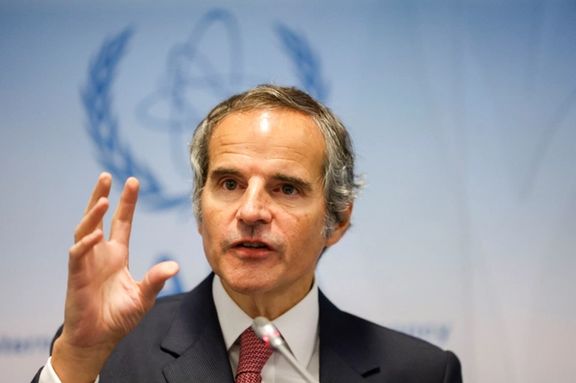US Says UN Nuclear Body Should Prepare For ‘Further Action’ Over Iran

The International Atomic Energy Agency board passed a motion Thursday calling it “essential and urgent” that Iran satisfy agency enquiries over its nuclear program.

The International Atomic Energy Agency board passed a motion Thursday calling it “essential and urgent” that Iran satisfy agency enquiries over its nuclear program.
The motion – drafted by the France, Germany, the United Kingdom, and the United States – focused on uranium traces found in sites used before 2003 but never declared as nuclear-related. Tehran has said the IAEA’s line of questioning came after Israeli allegations made in 2018 and should be dropped as a condition for reviving the lapsed 2015 Iran nuclear agreement.
A US statement said that if Iran failed “to provide the cooperation necessary,” the IAEA governors’ board “will have to be prepared to take further action.” The statement cited an article in the agency statutes that allows for referral to the United Nations Security Council (UNSC).
A similar vote passed the 35-member board in June by 30 votes to two, with three abstentions from India, Libya, and Pakistan. Thursday’s motion was backed by 26 member states, with two voting against, five abstentions, and two absent. Mikhail Ulyanov, Russian ambassador to United Nations bodies in Vienna including the IAEA, tweeted that “from the Russian viewpoint” this was “better than in June.”
Russia and China have argued that raising resolutions at the IAEA board harms efforts to revive the 2015 Iran nuclear agreement, the JCPOA (Joint Comprehensive Plan of Action), and will encourage Iranian intransigence. After June’s vote, Iran removed IAEA monitoring equipment including surveillance cameras installed under the JCPOA.
Moscow and Beijing say the primary responsibility for restoring the JCPOA lies with Washington, which unilaterally left the agreement in 2018 and began ‘maximum pressure’ sanctions that prompted Iran by 2019 to expand its nuclear program beyond JCPOA limits.
While the US might succeed at a subsequent board meeting in referring Iran to the UNSC there is scant chance of a repeat of 2006, when Russia and China agreed at the council to the UN sanctions against Iran that were largely lifted in 2015 when the JCPOA was agreed.
Technical meeting in doubt
A ‘technical’ meeting earlier proposed by Iran for later this month to discuss the uranium traces remains in doubt after a statement from Tehran’s nuclear chief Mohammad Eslami Wednesday. IAEA chief Rafael Mariano Grossi has emphasized the importance of restoring fuller IAEA access in Iran, which Tehran has reduced right before the Vienna talks to restore the JCPOA began in April 2021. Grossi is also insisting Iran is obliged to explain the uranium traces, regardless of the JCPOA talks, under its basic commitments under the Nuclear Non-Proliferation Treaty.
While the US administration of President Joe Biden took office committed to revive the JCPOA it has failed to agree terms with Iran. Multilateral and bilateral talks lasting 18 months have stalled over which US sanctions contravene the 2015 agreement and whether Iran should have ‘guarantees’ to cushion against a second US withdrawal.
Rob Malley, the US Iran envoy said this week the US had lost focus over the JCPOA because of Iran supplying military drones to Russia and its treatment of domestic protestors. French President Emmanuel Macron Monday, just days after suggesting a ‘revolution’ was underway in Iran, suggested that a wider agreement with Tehran was more feasible than JCPOA restoration, so rejecting the view of the JCPOA as a first step to wider progress but itself a valuable non-proliferation measure.